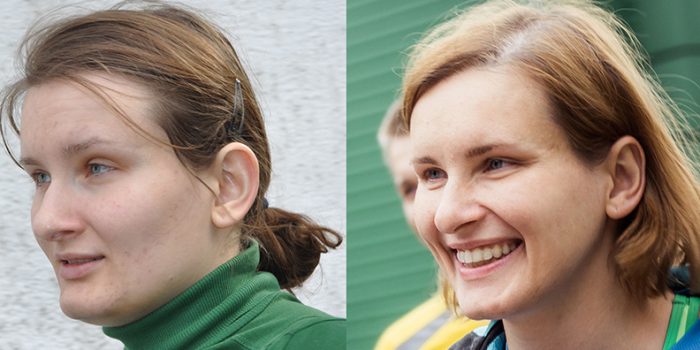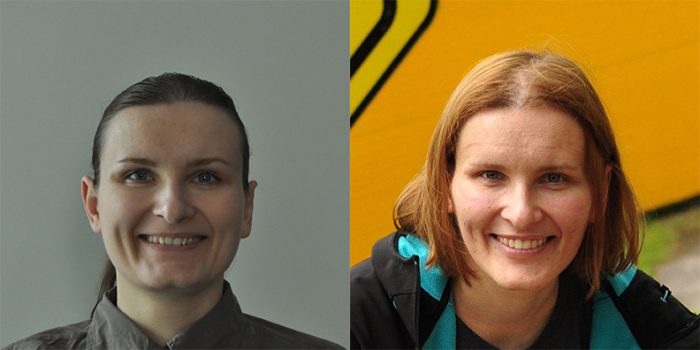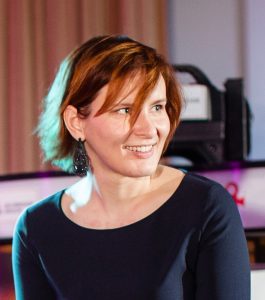The post-operative period passes rapidly, even though it seems at the time that things can’t get any harder. Of course, it’s always fun when you have you have to put in less effort. On the other hand, quickly obtained things are not appreciated that much. Besides, we live only once – if we feel bad about something and we have an opportunity to change it, then we should do it. Already there are too many things in life that are not up to us.
Viktorija, what was your life like before surgery? What troubles you’ve experienced due to malocclusion and position of jaws? Have you tried to deal with this problem on your own?
Since childhood, I had crooked teeth, i. e., the maxillary lateral incisors were more protruded than the central incisors. I avoided smiling or smiled with my lips pursed. Even when smiling in this way, I didn’t look nice: due to deep occlusion, my teeth seemed to look concave, and the chin looked protrusive. When I was a child, I did not know about occlusion, so I mostly worried about crooked teeth. As much as I remember, my mother tried to solve this problem by taking me to the orthodontist in the fourth grade and some later grade. Still, in those times, in the town where I lived, there was just one treatment method available – with wires and plates. Both times it seemed very painful me and my childish determination to have straight teeth evaporated rapidly.
In fact, in twelfth grade, during my visit to the odontologist’s office, I received a proposal to have these two protruding teeth fixed. Again, by application of plates, but at that time, they were already more advanced, fitted with screws. At first, my teeth were pushed slightly to the sides, and, when enough space occurred, central incisors were pushed to the front. I saw the result within six months. I was delighted because the appearance was far better than before. Of course, I should have worn the plate further on, and later I used to put it in my mouth for nighttime only. This process lasted for several years until the plate finally broke. It seemed that the teeth are in their place, so I didn’t bother myself about it. But it was a half-truth because they were gradually returning to their old positions. Even though I had straighter teeth, I didn’t learn to smile. To be precise, I knew that I look unattractive when I smile, so I avoided doing it. I appeared angry, even though I wasn’t.
What encouraged you to choose this treatment?
Since I was bothered for many years by the idea of my teeth returning to their old position (perhaps I used to be more anxious than it was worth it), I had decided to fix my teeth with braces. I learned about my occlusion type and orthognathic treatment only during the initial consultation with the orthodontist. It was explained to me that the teeth could be straightened simply with the help of braces, however, if I want to accomplish changes in the zone of lips, then only orthognathic surgery could help me. The orthodontist proposed to visit doctor Simonas Grybauskas for consultation and get answers to the relevant questions. Before the first consultation, I learned a lot about this treatment method. I accumulated details about what suffering patients must go through during the post-operative period, just about enough to feel terrified. Information was very detailed, and then I just made a sign of the cross over this treatment option. However, I still went to consultation because it wasn’t clear how many jaw surgeries I will need (in case of just one jaw surgery, it all looked much simpler).
Have you considered any alternatives?
The alternative was clear – simply to straighten the teeth with braces. Still, during the consultation, I received information that straightening teeth only with braces is not really worth doing.
Before choosing orthognathic treatment, have you made inquiries about the experiences, opinions of others?
I received all the information on orthognathic treatment from my orthodontist, doctor Simonas Grybauskas, and from the internet. I didn’t know any person who had this surgery in person. On the internet, I’ve read in detail what awaits the person who chooses this treatment method. The following words were the most memorable: “how little love one must-have for oneself to bring such suffering upon oneself.” I learned that there is a possibility of complications occurring during the surgery, which didn’t add courage to making up my mind to take this step. Later, after finding out that dr. S. Grybauskas is one of the best surgeons in this field, not only in Lithuania but also abroad, and I calmed down a bit.
Did you need support from your relatives or friends? What was their reaction like when they learned that you decided to have surgery?
From the start, only my boyfriend knew about my choice, and he didn’t try to influence my decision, he simply said that it’s up to me to decide. A bit later, I mustered up my courage and told my mom. She, of course, was worried about it, so at first, she asked why I need this, but later, as time passed, I got used to it and came to terms with it. I told my friends shortly before the surgery. It was challenging to say precisely what will be done to me and what benefits will it bring. There were different reactions, but virtually nobody condemned me for it.
How did the treatment process go? What moments were the most difficult? Most comforting?
Orthognathic treatment is not only surgery, but it’s also a long preparation period before the surgery, and it demands a lot of patience. It is a challenging time. Still, it’s essential to realize how critically important are these few millimeters of dental shift for the ultimate result. Many things happened: dental models were lost, the surgery date was postponed, there were many miscellaneous things which seemed like a tragedy at that time.
As the finish line of the treatment was getting closer, five consultations were lying ahead. During them, I was photographed and consulted on how to behave during the post-operative period. Back then, the fear of surgery was overwhelmed by the fear of its postponement – if fever or slightest sore in the mouth occurs, the surgery will be postponed because such symptoms are considered life-threatening. Long story short, it was yet another small tragedy and reason to go nuts. Still, as soon as I got admitted into the hospital, everything moved on its own accord, even going to the operating room wasn’t scary.
Well, the hardest moment was not the moment but the entire night right after the surgery, as the effect of the narcosis wore down, a multitude of unpleasant sensation started flowing in inability to breathe in a usual way, a cooling mask, reducing the swelling pressured to tightly, painful sensations in the throat when swallowing saliva, aching in the heart area (they connected me to the cardiac monitoring electrodes and instilled some heart drops). Later in the night, a nosebleed occurred, but I probably swallowed most of it with saliva. Not the slightest thought about sleeping visited my mind – the fear of choking kept my eyes wide open. The nurses couldn’t fix the tightly fitting mask, so the entire night after the surgery turned into anticipation for morning visitation when the specialists will come and fix my mask. Half sitting, I observed the breaking dawn through the window in front of me; however, to my dismay, that window faced the inner court – the last place where the sun showed up.
In the morning, another surgeon examined me, loosened the mask, and I was transferred from the intensive care to my ward. I thought it would be even worse – it might be impossible to call somebody for help is need be. However, it all turned out on the contrary: a nurse watched over me, who took care of me as if I was her child, she almost turned me into a human, showed how to wash up, how to rinse mouth. I was enabled, although slowly and with a dizzy head, to walk to the toilet on my own. Eating through syringe used to take long, and not all food managed to reach the stomach – due to sensitive larynxes, I simply coughed out a part of it.
Visitors started rushing in since day one. My mom was with me since afternoon, later, after figuring out the department of the hospital and the ward by themselves, my two girlfriends came over and brought some baby puree. Even though I’d enjoy it since it had much more flavor than hospital food, I wasn’t able to eat it. As I recall it, I had little luck communicating my thoughts in words, so our communication happened through the language of gestures and weird sounds. Still, it was like this only on the first day. I spent Tuesday, Wednesday, and Thursday at the hospital. Regaining the habits of a civilized person was getting easier each day. Still, the face swelled even more and resembled a pear. Of course, it wasn’t unexpected, but it was difficult to see myself when looking at the mirror. On Friday afternoon, I was discharged from the hospital, so I walked and did many things by myself, but my head felt dizzy, so I received a referral to go to the sanitarium at my mom’s place with exquisite food included. However, I’ve managed to stay there for less than a week: my mom looked after her 1,5-year-old granddaughter, her ninety-years old mother, and me. I didn’t want to be a burden to her. Out of the trio, I was the one most capable of taking care of myself, so I made an effort to become independent on my own. As time went on, it ran faster and faster – in two weeks after the surgery I was already working from home, after three weeks I dared to show up at work. Of course, that wasn’t the end of it, for four months, I had to monitor what I’m putting in my mouth. At first, it was mashed soups, later – stews. Even after four months passed, I didn’t return immediately to roasts and steaks – I was a bit frightened to chew. I had to visit the surgeon for examinations often, and at the end of the year, the treatment with braces was renewed, and in May, they were removed. Yes, back then, the time passed slowly, but when as look back, it seems that the post-operative period passed quickly.
In your opinion, what is critically important when deciding and choosing orthognathic treatment? What would you advise other people who encounter a similar situation?
The main question that a person must answer to oneself – how difficult it is for me to be in the current situation? Both physically and psychologically. There’s nothing wrong if the biggest problem that a person wants to solve is an aesthetic one. It is essential to be open with yourself, to assess your expectations, to see whether the accomplished result will outweigh experienced temporary inconveniences.
How did your life change after the treatment (both professionally and personally)?
Answering this question is both easy and complicated. It’s not difficult to name the things that changed, but it’s hard to tell whether those changes occurred due to the surgery. It so happened that one month before surgery, my long-term relationship with my boyfriend came to an end. Still, I can tell that surgery wasn’t the cause of our breakup. Yet, surgery-related changes started before it happened. I was very much worried about my health: not because of the quality of my blood (I have a predisposition to anemia), but also for my immune system. I’ve read stories about how surgeries are postponed due to increased body temperature or similar things. I decided to change something so that my health would not be that accidental unpredictable indicator ruining all plans. That’s how I discovered sports. Before surgery, I’ve been running. After the surgery, my desire to do sports didn’t go away: the running was supplemented with intensive cardio workouts (surely, I’m very happy to have excellent conditions for doing sports at work). At school and university, I used to hate sports classes, used to run only a one-third of the distance, my side used to ache, so my sportive achievements were limited by the board of chess and purchasing of sports trainers. Before the surgery, running and sports were trending and hyped, so I gave in to the mania. Now for me, it’s even hard to imagine my life without any kind of sports. Before the surgery, it was a great way to handle the increasing anxiety. I didn’t start running in marathons, but the distance of 10 kilometers that seemed like a tremendous challenge to me, no longer scares me.
I can boldly claim that I became more self-confident, courageous, and spontaneous. Of course, I had the latter character trait earlier too, but I had to coordinate it with my other half, but now, even though there are more responsibilities and works, I simply do it because I know that no one will do it for me. Moreover, many things that seemed scary or demanded courage earlier, now I compare them in my mind the surgery I had, and the question “to do or not to do?” disappears. That’s how traveling, active participation in the couch surfing system, tango, and guitar appeared in my life. I went paragliding, did a bungee jump off the bridge, hitchhiked, and rode a bicycle to Nida. Getting home tired, but knowing that a day didn’t pass in vain comforts me. It’s unlikely that surgery influenced my career because a pretty smile is not necessary for my work, but with her, I’m no longer an angry programmer. Those who understand what I’ve been through, compliment my determination, and transformed appearance.
If you could turn back time, already knowing and experiencing that, and as much as now, would you still choose to have orthognathic treatment?
Without a doubt, the post-operative period passes rapidly, even though at the time, it seems that it cannot get any harder. Of course, it’s always fun when you must put in less effort. On the other hand, easily obtained things are not appreciated that much. Besides, we live only once – if we feel bad about something and we have an opportunity to change it, then we should do it. Already there too many things in life that are not up to us.






